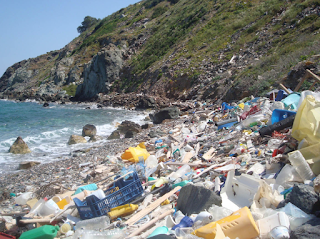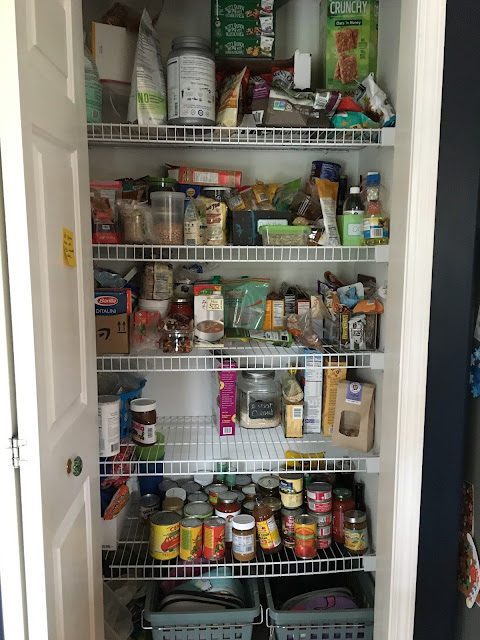Let's Tackle Our Kitchen Plastic First
I finished the Bea Johnson book and have found a bunch of neat blogs about going zero-waste. I even started mining through Pinterest for ideas. Now, how can I get started?
The key is to start slow and tackle the low-hanging fruit. I already bring reusable bags everywhere I go, and have been for years, so ... Check! And we avoid buying plastic water bottles, instead using the assortment of reusable bottles we already own. Check!
So, I ask myself, what makes sense NEXT for my current household? The answer, I think, is reducing single-use plastic (including packaging) in the kitchen. Here's my game plan:
Buy Bulk! I discovered two (maybe three) of my neighborhood markets have a bulk section, so I've been bringing home the granola, chickpeas, couscous, nuts, dried fruit to test on the family. Bonus, they happen to be healthy snacks and meal-building items! The prices? So far, they are the same or better than buying prepackaged. Though, I did invest in reusable bags from Amazon (10€ for 8) and some glass jars to fill up at home (20€ for 6).
Carton milk! When we first arrived, I bought milk in plastic bottles. After looking a bit more, there is organic milk sold in paper cartons. This is a better buy as it can be recycled many times over. Plastics can only be recycled once. Not to mention one study found some plastics leach chemicals into food. Blah.
Fresh Fruit and Veg! I'm lucky to be living in a city where the produce areas use paper bags (I never see those plastic produce bags that are all over the US). So I can eliminate plastic bags from the grocery store, altogether. However, there is plastic around delicate produce, like tomatoes or strawberries, so I'm finding ways around them. For example: at one veg market, they sell grapes in plastic baskets. When I buy them, I dump them from their plastic basket into the paper produce bag, and leave the basket for them to reuse. Win win!
Paper Towels! Single-use paper towels and the plastic they come in can easily be swapped with towels or rags that can be laundered. Leah had two stained shirts that I cut up -- and they clean up WAY better than a paper towel.
Choose the glass over the plastic: When looking for certain spices or condiments, I'll choose the ones in the glass jar instead of the plastic. I can reuse the glass jar around the house, or it's recyclable.
So far, this is the upside. However, I'm already seeing a number of challenges to reducing plastics in the kichen. Including ...
Dish and dishwasher soap: All soap comes in plastic bottles and I have yet to seen it in glass, or in bulk to refill my own receptical. I'll keep looking.
Meat! I pickup my chicken and ham already tightly-wrapped in plastic. This is mostly because I haven't worked up the courage to go into a French butcher shop. I'll do it!
I'm going to falter. I going to let the kids get chips in the plastic bag. Or cookies. I still have plastic ziplocks in the drawer and plastic juice bottles in the fridge. This isn't an overnight change. Because it's not just a shopping change, it's going to change the way we eat (for the better, if you ask me). But this is important, so if I'm patient and just take baby steps, find one more solution each time I walk into a market, I'll get to where I want to be eventually.
And there's PLENTY OF REASONS for doing this. Want to be reminded of a few? I pulled these points from an older article in this Scientific American site:
• Chemicals added to plastics are absorbed by human bodies. Some of these compounds have been found to alter hormones or have other potential human health effects.
• Plastic debris, laced with chemicals and often ingested by marine animals, can injure or poison wildlife.
• Floating plastic waste, which can survive for thousands of years in water, serves as mini transportation devices for invasive species, disrupting habitats.
• Plastic buried deep in landfills can leach harmful chemicals that spread into groundwater.
• Around 4 percent of world oil production is used as a feedstock to make plastics, and a similar amount is consumed as energy in the process.
And click here to see a picture fisherman in Manila navigating the garbage ... if that's not motivating, I'm not sure what is!
Geez! What kind of planet will we be leaving for our grandkids?! It's depressing to even imagine. I figure, if I can start here, in a country I can't even communicate in the same language, I can do it anywhere. Join me!
Related posts:
More Sustainability posts
The key is to start slow and tackle the low-hanging fruit. I already bring reusable bags everywhere I go, and have been for years, so ... Check! And we avoid buying plastic water bottles, instead using the assortment of reusable bottles we already own. Check!
So, I ask myself, what makes sense NEXT for my current household? The answer, I think, is reducing single-use plastic (including packaging) in the kitchen. Here's my game plan:
 |
| Bulk Nuts and Chickpeas in My Reusable Bags |
Carton milk! When we first arrived, I bought milk in plastic bottles. After looking a bit more, there is organic milk sold in paper cartons. This is a better buy as it can be recycled many times over. Plastics can only be recycled once. Not to mention one study found some plastics leach chemicals into food. Blah.
Fresh Fruit and Veg! I'm lucky to be living in a city where the produce areas use paper bags (I never see those plastic produce bags that are all over the US). So I can eliminate plastic bags from the grocery store, altogether. However, there is plastic around delicate produce, like tomatoes or strawberries, so I'm finding ways around them. For example: at one veg market, they sell grapes in plastic baskets. When I buy them, I dump them from their plastic basket into the paper produce bag, and leave the basket for them to reuse. Win win!
Paper Towels! Single-use paper towels and the plastic they come in can easily be swapped with towels or rags that can be laundered. Leah had two stained shirts that I cut up -- and they clean up WAY better than a paper towel.
 |
| Banana Chips In Jars |
So far, this is the upside. However, I'm already seeing a number of challenges to reducing plastics in the kichen. Including ...
Dish and dishwasher soap: All soap comes in plastic bottles and I have yet to seen it in glass, or in bulk to refill my own receptical. I'll keep looking.
Meat! I pickup my chicken and ham already tightly-wrapped in plastic. This is mostly because I haven't worked up the courage to go into a French butcher shop. I'll do it!
I'm going to falter. I going to let the kids get chips in the plastic bag. Or cookies. I still have plastic ziplocks in the drawer and plastic juice bottles in the fridge. This isn't an overnight change. Because it's not just a shopping change, it's going to change the way we eat (for the better, if you ask me). But this is important, so if I'm patient and just take baby steps, find one more solution each time I walk into a market, I'll get to where I want to be eventually.
 |
| This Is Not Awesome! (source: thefisheriesblog) |
• Chemicals added to plastics are absorbed by human bodies. Some of these compounds have been found to alter hormones or have other potential human health effects.
• Plastic debris, laced with chemicals and often ingested by marine animals, can injure or poison wildlife.
• Floating plastic waste, which can survive for thousands of years in water, serves as mini transportation devices for invasive species, disrupting habitats.
• Plastic buried deep in landfills can leach harmful chemicals that spread into groundwater.
• Around 4 percent of world oil production is used as a feedstock to make plastics, and a similar amount is consumed as energy in the process.
And click here to see a picture fisherman in Manila navigating the garbage ... if that's not motivating, I'm not sure what is!
Geez! What kind of planet will we be leaving for our grandkids?! It's depressing to even imagine. I figure, if I can start here, in a country I can't even communicate in the same language, I can do it anywhere. Join me!
Related posts:
More Sustainability posts



Comments
Post a Comment